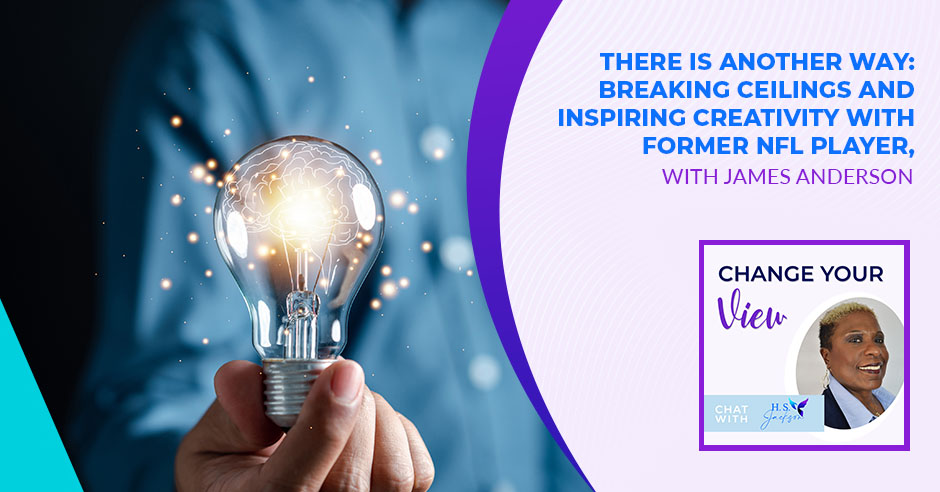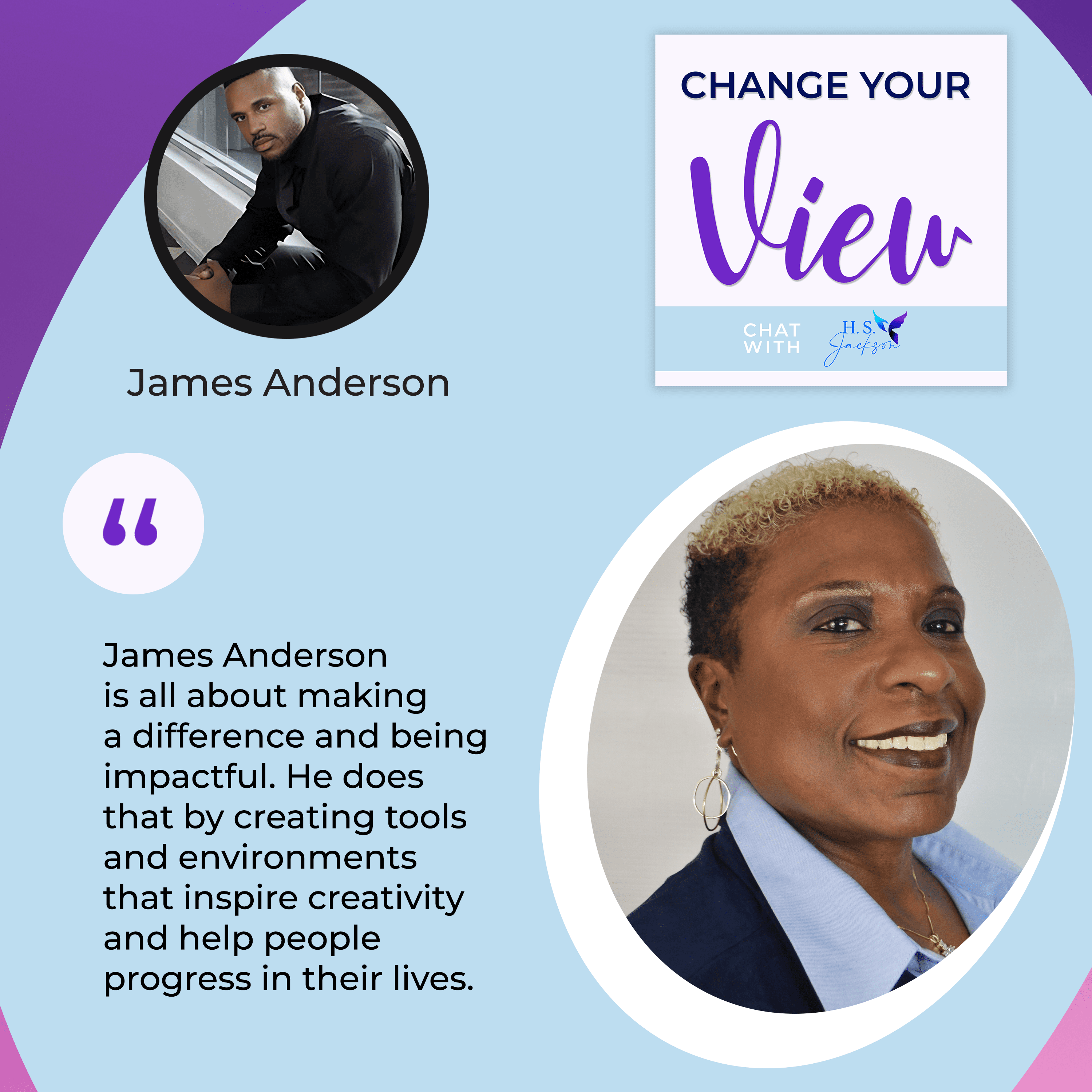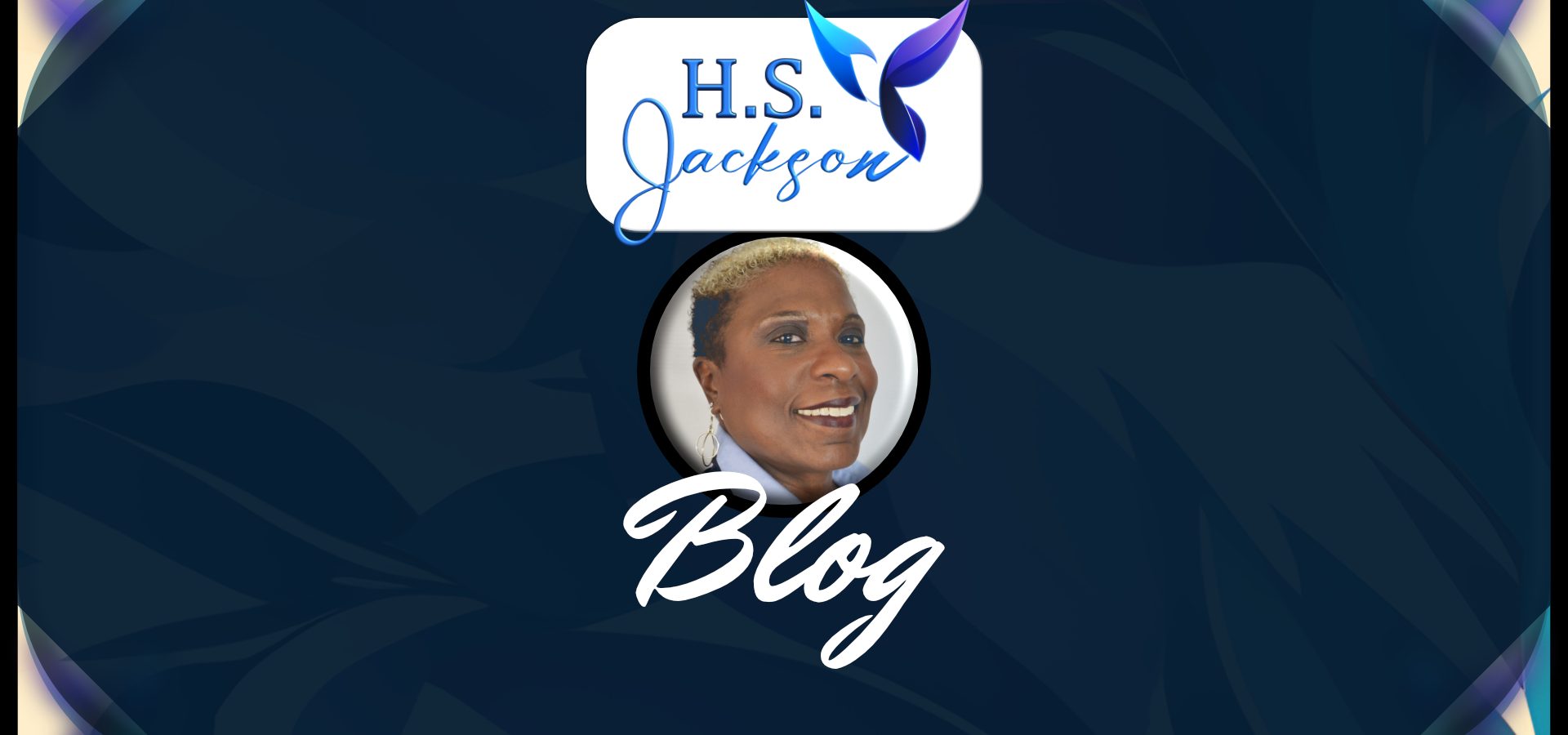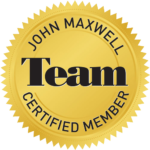
You don’t have to stay where you start. Sometimes, beginnings are merely stepping stones to another way. Your journey could take different twists and turns, leading you far from where you began. For James Anderson, NFL stands for Not For Long, and his career evolution shows an inspiring transformation that took him from being a record-breaking NFL linebacker to an educator. In this episode, he sits down opposite host Haseena Shaheed-Jackson to share his dramatic shift from the football field to the nonprofit field. Reflecting on the fleeting nature of an NFL career, James emphasizes the importance of embracing change and pursuing one’s true passion. With a newfound perspective after becoming a father, James dives into his mission of providing quality education for young children. He discusses the significance of early childhood education and the need to foster creativity in the classroom. Join Haseena and James as they explore the challenges and opportunities within the education system and the importance of setting boundaries rather than limitations.
—
Watch the episode here
Listen to the podcast here
There Is Another Way: Breaking Ceilings And Inspiring Creativity With Former NFL Player, James Anderson
I have on our show someone that you should know, James Anderson. He was an NFL player for ten years. He changed his view to now become an educator and a golfer. He did a flip because he said the NFL stands for Not For Long. He knew that was not some place that he needed to stay. Let’s listen to his story because he has a powerful story that will help you. If you’re thinking that you have to stay somewhere, don’t ever think that you have to stay where you start. You can move on to doing something that is in your passion, and that is driving you to be impactful and significant. Let’s listen to James’s story. I’ll be back afterwards to do a recap of our discussion and to give you my thoughts on how our talk went.

James Anderson, thank you for joining me. I appreciate you taking this time. You have such an interesting story that I know the audience is going to be excited to learn about how you have made some changes in your life. I was very interested because you were a pro football player, and now you’ve changed the direction where you are a golfer and an educator. How did you change that view? What made you change that view?
First of all, thank you for having me on the show and for giving me an opportunity to spend some time. I played a sport that was the NFL. A lot of people think those letters represent the National Football League. As a player, we realized those letters represent Not For Long. That’s a career where the average is less than three years. I had to understand very quickly that I was blessed to be there, but I wasn’t going to be there for long. Fortunately, I was able to play for ten years. I had a nice long career. I think the thing that changed my view on life was having children.
My mother was an educator and my father was a minister. I always kept education at the forefront of what I did. The first time I laid eyes on my daughter, it dawned on me that now I have a life that I’m responsible for. It is my duty and it is my responsibility to make sure that she enters into an environment that I feel is worthy of having her.
I love what you said about “not for long” because we get stuck in a way of life. We then are leery and fearful of that transition. I think about myself. I worked a job in Corporate America and then the government for twenty years. I was fearful of making that change because I made good money. Money doesn’t solve everything. If you’re chasing money, then you’re not chasing your passion. You’re not chasing your purpose. You’re just following along and not being impactful and making a difference. One of the things that you said in your story is that you want to make a difference. You want to be impactful. What does that mean when you say that?
I had a mentor growing up and they always used to say, “In this life, every person who comes into this world has two things in common. They were born on this day and they died on this day.” The difference in the people you remember is the ones who did something with their dash. That little dash in the middle between born date and the death date is your life.
What are you going to do with that life? What legacy are you going to create? What impact are you going to make to last long? When your children, grandchildren, and great-grandchildren walk into the room, what will they say about James Anderson? To me, that’s important. That oftentimes doesn’t come from chasing money or any kind of wealth. That oftentimes comes from creating tools and environments to help progress the lives of people.
The thing is now we are in the education arena. I know you said you were raised around educators and that’s why you went down that track, but you’re specifically targeting the younger children. What are the age ranges of the younger children that’s your market?
Right now, I target early childhood, school-aged kids, so first or third grade. I felt like it was very important because if you look at statistical studies, that’s the age group that’s most vital to grasp them. If you don’t get a child in that age group into education, into literacy, or on the right path, there’s something like an 80% chance that they won’t even graduate high school. That is a pivotal time in my mind. That was a pivotal time to get to children. My mother was a first-grade teacher, so that’s the environment I grew up around. I felt like getting kids at that age and putting them on the right path early in life set them up to be successful.
The other thing that you mentioned was you had a shift in mindset when you had your girls. Why did you have that shift in mindset?
I feel like it’s always different when it’s yours. I was always working with children. I always worked with somebody else’s child. Although you care for them and you want to create an environment that’s best for them, it’s different when it’s your daughter. You can go into a store and see a pair of shoes like, “Those shoes are dirty.” If they’re your shoes, you respond differently when it’s something that’s yours. When I started having kids of my own, I had to put on a different pair of glasses. My perspective on what was happening in the educational space changed.
That’s what the shift was. The shift was having my own child and realizing that one day, what kind of environment is my daughter going to go in? What kind of curriculum is she going to learn? What is school going to be like when I send her out of my house for eight hours a day, in which she’ll spend more time in school or twice as much time in school on a regular day than she’ll spend at home? What does that like? What does that look like? Those things became vitally important to me.
That’s so true. It’s when you work a job, you are away from home for maybe 10 to 11 hours a day if you include your commuting time. Your child is gone and their mind is being molded by that educational system. What do you see as being roadblocks or opportunities? On both sides, do you see the opportunities and the challenges that are occurring in our educational system? What do you see there?
I’ll answer that question like this. If you ask a child 1st, 2nd, 3rd, maybe up in 4th grade, “What is it that you want to be when you grow up?” You’ll hear all kinds of, “I want to be an astronaut. I want to be the president.” My daughter wants to be a singer. You’ve got all these big dreams and all these big goals. If you go ask somebody who’s in high school what they want to be, half of them have no clue what they even want to study. What happened? Sometimes in education, there is a way to do things and there’s a curriculum that has to be taught and it has to be taught a certain way. When you teach things that only have one method of solving a question, you put a ceiling on how creative and open that child’s mind can work.
Sometimes, when you teach things that only have one method of solving a question, you put a ceiling on how creative and open that child's mind can work. Share on X
I think it’s a catch-22. If you create concepts that are left up to interpretation and it’s being taught differently in every class, you can’t control the performer’s outcome of it. You can’t control how to grade things because everybody has a different perspective. On the other side of it, if you do that only, that can become a detriment because what you’re teaching these children is that there’s only one way to do things. It is either this way or the highway. If you do it like this, it’s wrong.
If you take a child who’s been in the educational system for 10, 12, until 16 years, and they’ve always been taught, “You have to solve it this way, and it’s only this way.” When they get into the real world and they have a plethora of options to them, some kids are lost. It’s like, “I’m not used to having options. I don’t know how to think creatively. I don’t know how to think creatively. I was taught that it’s got to be like this.” I believe within that catch-22, there’s room for expansion and to allow for creative thinking, as well as setting up boundaries because I believe in healthy boundaries as well.
You raised an interesting point because I was listening to a message the other day and what you said resonates so deeply with me. It said the same thing that you said. If you ask a child at the ages that you said, when they’re 1st, 2nd, or 3rd grade, they’ll tell you that they have this dream to be a lawyer, a doctor, or whatever. As they progress through life, if you ask them later on, they have lessened their capabilities because they have been taught instead not to have aspirations to go higher.
Instead, they’re taught, “You should just do this because you’re not going to be able to make that a possibility.” That’s what we have to work on. We cannot hinder the creativity and the beliefs of what our children know that they can do. None of us are winners and we are given those gifts and talents, and it’s for us to allow those gifts and talents to be used to their fullest intent. It’s for the school system to help bring that out. I love what you’re saying. How are you forging your path in the education system based on those challenges that you see?
My philosophy when it comes to a lot of things like parenting is I believe in boundaries, not limitations. I believe that interpretation of those words is important because if I set a healthy boundary, I’m setting parameters for you to figure out what you want to do within. If I set a limitation, I’m telling you what you can and cannot do. There’s a difference. In your brain, if I tell you, “You can do it, as long as you do it in between A and B,” it resonates differently in your brain instead of me saying, “You can’t do that.” Even the verbiage is you can do versus you can’t do. That’s a perspective that often is overlooked, how verbiage or how words resonate in our brain, and how that impacts how our children perceive what they’re supposed to do.
What I’ve been working hard on is a couple of things. I’m working with a friend of mine to build an educational system around emotional intelligence, mental well-being, as well as creative thinking. These are very important concepts to me because I feel like oftentimes in life, we aren’t given or don’t possess the tools to deal with anything emotional, whether it be trauma or anything in the past. When we don’t possess those tools or deal with these things, we carry that with us, and those hindrances affect how we make decisions. We can learn how to be emotionally available for our kids as the community or the village. I was always raised to believe that it takes a village to raise a child.
If the people are there but they aren’t emotionally available, are they really there? Those are some of the things I’ve been working on, as well as some stuff with fatherhood. I believe the presence of a man is vitally important, especially for young boys. I believe that it’s also vitally important for young girls. I believe that as a father, it’s my job to be an example to my daughters of what they’re supposed to look for and what a man is supposed to be.
I totally understand and agree because we have to learn how to take off limits in our mind that we placed there, and starting at the age that we are, then that means that the sky will be the limit instead of hindering. Now, when we get to be at the age where we think, “I’m going back to school now.” A perfect example is I’m pursuing my second Master’s in Human Services. It is an eye-opening experience for me because I have not been in school for a while. Looking at the curriculum and the things I have to do, I’m like, “This is too much. Can I do this?” I have to stop that negative thinking to go, “This is not too much. Yes, you can do this. Get over there, sit down, read that book, write that paper up, and do what you need to do.”
At the end of the day, the more I read, it’s like a sponge. I’m reading about history, how things began, and why it’s so important that we don’t put these parameters around people. Someone else was raised in a home where their parents were wealthy, but someone else didn’t have those same benefits. We cannot have that mindset that people are lazy and unworthy and that they have behaviors they want to have. That’s not true. People need some help to get them in the right direction.
If we would give them that help and offer them that hand, it would help make this world so much better. It would help that person to be a productive person in society instead of being someone that you put in the corner and say, “They’re not going to ever amount or anything.” Now, you put limits on what they can do and they believe in that instead of saying, “You can do whatever you choose to do if you put your mind to it.”
If I were to put limitations on my kids, it would be limitations on going backwards. I believe in glass ceilings with concrete floors. Meaning concrete is something we can make. It’s something we can pour more on and we can raise the floor. I say glass ceilings because there’s a limit you reach where it’s going to take an extraordinary amount of effort from you to go higher. You can see where you can go, you can see how high you can get, and you can see that the sky is the limit, but there’s a barrier. When you break your glass, that oftentimes comes with pain. Breaking glass cuts, bruises, and bleeding. You’ve got to go through something to get to the next level, but you can make it. When you break that ceiling, you pour that concrete and we don’t look back.
I’m a person of faith. If you look at all the people in the Bible like Moses, he had to go through what he went through. He was running from Pharaoh, and living in the desert for 40 years before he became the leader that he was for the Israelites. Joseph had to go through slavery for fourteen years before he became the Prince of Egypt.
Esther had to go through being a concubine before she became the queen of her country. She had to go through the trial of fasting and praying to be the savior for her people who are going to be annihilated. We all have to go through those storms and trials in order to add to our character to become the person that we need to be. We have to saddle up and keep going, and not look at the fact that this is so hard. Instead, this is what I need in order to get to where I need to go.
Being an athlete, I relate everything to sports. That’s where my comfort is, relating everything to sports. If you look at everything that has to do with sports, that’s good for your body. A deep tissue massage working out in the gym, training, and all these things that are good for your body oftentimes hurt. There’s always pain associated with things that are good for your body. In life, oftentimes when you have things coming your way that are going to be a blessing, you often have to go through trials. You’ve got to go through some pain to prepare yourself to be in a place of grace and a place of thanks when you get that blessing.
There is always pain associated with things that are good for your body and life. Share on X
You have to flip their perspective. Instead of looking at, “This is painful and this is hurting,” you have to look at, “This pain is going to make me better.” That’s how we have to change or how we view things. I agree with you totally. I’ve been working out. I started when I went to college, and this has become a way of life for me. My parents and siblings used to always tease me because they said, “Don’t call at this time because she’s not going to answer the phone.”
“We are in the gym. We’re working out.”
I was like, “This is my time.” It’s for your body, but also your mind. I would be texting and making notes on my phone while I’m working out because a thought would come to me because I’m a writer. A thought comes and I’m like, “I’ve got to write this down now.” I end up texting myself and making up all these notes that I sent myself later on to add on and to help my writing process. We have to know that whatever we go through is for our good. What are your top three values and why?
I would say faith, hard work, and I don’t know if it’s a value, but I say your word. I feel like what you believe in and what I believe in allows me to be where I need to be mentally, physically, emotionally, and spiritually. There’s nothing you can’t achieve if you’re willing to work hard and forward. I also believe that especially as a man, the one thing that you have is your word. When you say you are going to do something, you got to do it. I live by that with my daughters. If I tell my daughter, “If you do this, daddy would do this.” No matter how daddy feels, if she does what she’s supposed to do, daddy got to upend his order to bargain.
I have to teach her that what she says means something. There’s a value, a weight, and an interest. There are things put on the words that come out of your mouth. You can’t just spew things and say what you’re going to do and what you’re not going to do if you’re not willing to uphold your end of the bargain. Those are the three things at the forefront because I felt like my faith in my hard work is what allowed me to play ten years in the league.
I totally agree with you. I was raised as a Muslim. My word was my bond. That was the way I was taught. Whatever you say, you have to be willing to stick by it. I’m a person that if I’m not going to do something or if I know that it’s going to hurt your feelings, then I won’t say it. If you want me to be honest with you, you have to learn how to pepper your words. I had to learn how to do that because kids have no filters. I used to have no filters, and then I used to think to myself, “Is that right? What if somebody said those things to you?” I totally agree with you. What is your favorite quote or saying? What is something that resonates with you that keeps you going?
I always think about a couple of things. One, hard work beats talent, and talent doesn’t work hard. That always plays into my dedication and my discipline, whether that’s training at the gym or doing my speed sessions for golf. Where my biggest struggle, not having a schedule now, is sticking to business meetings, doing my calls, and that kind of stuff. That goes back to that. The other one is, what’s your legacy? What is your name? We always had a saying in football that said, “You play for your team, but the biggest thing is you play for the name that’s on the back of your jersey.”
People remember that I play for the Panthers, but they remember that was James Anderson who played for the Panthers. That Anderson was the part that was important. On the flip side, if I have done something not smart like getting a DUI or something crazy, ESPN wouldn’t say Panthers. It would say, “NFL linebacker James Anderson was dumb out there drinking and driving.” Your legacy, discipline, and hard work are the tenets that I live by.
How do you want to be remembered? I was reading the book and it resonated with me. You have to write your own eulogy. Don’t wait until you die for somebody else to write it for you. Write it now during this time because that lets you know what you’re doing in this lifetime and if you will be remembered. Write your own story so you can see how your story will be portrayed, and how others will look back and say what you do.
What’s interesting along that same line as I read a quote that said, “When you were born and came into this world, your mother cried. When you die and leave this world, would the world cry?” What was your impact? Did you do enough to impact enough people’s lives that when you leave this world, you’ll be missed?
Think about Michael Jackson’s funeral. People like that, whether they like him, hate him, whatever your opinion is, he makes such an impact on so many people’s lives that to this day, people still talk about the impact he made. He had hundreds and thousands of people on the video and on calls. That’s a person that you look at. You look at Martin Luther King and other people that spent their lives making an impact. You see the power of their impact when they leave this world.
It’s so true, and I love that. You have been very insightful. Is there one last thought you want to leave to someone out here that is maybe on the fence about making that transition and changing their view? How can you help them go in the direction that they need to be called in? I know it was not easy. You said NFL stands for Not For Long. We cannot become complacent in life. There’s a quote that I love that says, “Average is the safest choice, but it’s the most dangerous choice you can make.” We don’t want to be average. We want to be excellent. We want to be that person that we know we can’t be.
I was listening to Eric Thomas, and he talked about being average. He said, “When you’re average, you’re as close to the bottom as you are to the top.” Think about that. You’re as close to the bottom as you are to the top. You don’t want to be average. If somebody was on the fence thinking about taking a step to make a transition, especially from a sports perspective, we talk about, “If it was easy, anybody would do it.” You’re not just anybody. You do the hard thing because that’s what you’re supposed to do.
If it was easy, anybody would do it. You're not just anybody. You do the hard thing because that's what you're supposed to do. Share on X
James, thank you for your time. This has been a very enlightening conversation. You have made me do some thinking. We talked about golf earlier. I told you I love to play golf and that’s it. I said, “I don’t walk.”
Get out of that cart.
You said, “Are you alone here?” I said, “I won’t play with you.” What resonated with me was you said, “Get out that cart because you can open up your mind to experience nature and enjoy that creation, but also shake off that bad shot that you might have, give you time to decompress, and think about instead of focusing on that. If you riding that cart, you rushing next to your ball. If you have to walk to that ball, you can open up your mind and change your perspective in that short time versus holding on to that baggage that you had. That same thing applies in life. If we were to walk instead of running or jumping in that car to go somewhere, look how your perspective could change just by taking that little bit of time to pause and reflect.
If I were to say anything in closing, especially about life, it’s not about the destination, it’s about the journey. We’re not rushing to die. We’re trying to take our time to enjoy every step along the way. Understand that the journey is what matters even in golf. I’m not rushing to get to the eighteenth green. I don’t want to run in and run out. I want to be able to live and enjoy every shot it takes to get there.
If I’m running the car all the time or I’m on the go back and forth, sometimes you can get into your break and get into a zone. It’s like you’re driving home every day. You’ve driven that road so many times, you can oftentimes leave and get home before you realize it. I don’t want to start the round of golf and get to the end before I realize it. I want to be able to enjoy the round. That’s why I walk a lot.
In the end, we need to change our view so that we can keep moving forward to become the person that we were created to be. I thank you for your time, James.
Thank you for having me.
—
What an interesting discussion James and I had about creativity and placing limits on your thinking. It all starts with what you believe and what you think about, and then how we put those limits on ourselves because we don’t think that we can do something because of what our environment and our society have dictated and told us the way that we should go. Instead, we have to be willing to forge that path and go down that road that’s not paved and instead paved that way in leaving our own trail.
I loved what James said about how our children are in school for 8 to 10 hours a day. In those 8 to 10 hours a day, they’re being molded. They’re being molded into a way of thinking and being programmed to believe in only one way. We take that as we progress through life. We place those ceilings on what we can do. We have to break that mold. We cannot allow our community and those around us to dictate and sabotage what we want to do. You have to follow that path that you want to pave and move forward. Let no one and nothing stop you.
That’s not to say that you might not need that guidance and support because sometimes we can get lost in the shuffle. However, we must believe in what we can do and follow through. I love what James said. It resonated with me about creativity. I think about it. I worked on a job for over twenty years and I was told, “You had to fold this piece of paper up this way, that’s how you had to do your project.” However, that’s not the way we should put those boundaries on others.
We should say, “What I want you to have at the end of the day is X. However you get to X is up to you. Complete that project having this desired outcome. The steps that you take are totally how you progress.” That’s what we need to learn how to do. Stop putting those limits on what and the how, and instead say, “Go forward and create and build.” Thank you for your time. Know that you can change your view. You can do what you set out to do, believe in yourself, and take those steps to move forward and be whoever you want to be in doing whatever you want to do. Change Your View.
Important Link
About James Anderson
 A former record-breaking NFL linebacker with countless accolades for skill, professionalism, and leadership, James Anderson made a dramatic shift from the football field to the nonprofit field. His efforts largely focus on improving education. “Growing up I was always interested in art and engineering, the two things in school that really kind of drove me. I was a big math guy,” he says. He went to Virginia Tech to study engineering but quickly realized he was more interested in the creative side of the process and ended upgetting an undergraduate degree in art. He then acquired an MS in Education, Health and Physical Education, and an MBA. He is active in the Conscience Research Institute, Inc., an organization empowering fathers to become stronger advocates for their children by breaking through generational trauma in a supportive community. As the Vice President of Business Development for AINML Sense, a tech start-up, he’s on a mission to rid schools of gun violence and create safer spaces for growth. James is founder of the James Anderson Foundation. As its president, he partnered with Scholastic, Inc. to create the literacy program “Read Like a Pro,” donating thousands of books to light a spark in the minds of our next generation.
A former record-breaking NFL linebacker with countless accolades for skill, professionalism, and leadership, James Anderson made a dramatic shift from the football field to the nonprofit field. His efforts largely focus on improving education. “Growing up I was always interested in art and engineering, the two things in school that really kind of drove me. I was a big math guy,” he says. He went to Virginia Tech to study engineering but quickly realized he was more interested in the creative side of the process and ended upgetting an undergraduate degree in art. He then acquired an MS in Education, Health and Physical Education, and an MBA. He is active in the Conscience Research Institute, Inc., an organization empowering fathers to become stronger advocates for their children by breaking through generational trauma in a supportive community. As the Vice President of Business Development for AINML Sense, a tech start-up, he’s on a mission to rid schools of gun violence and create safer spaces for growth. James is founder of the James Anderson Foundation. As its president, he partnered with Scholastic, Inc. to create the literacy program “Read Like a Pro,” donating thousands of books to light a spark in the minds of our next generation.
James credits his success to his parents, a schoolteacher and a pastor, who instilled a powerful belief in God, education, community, and the importance of giving back.




